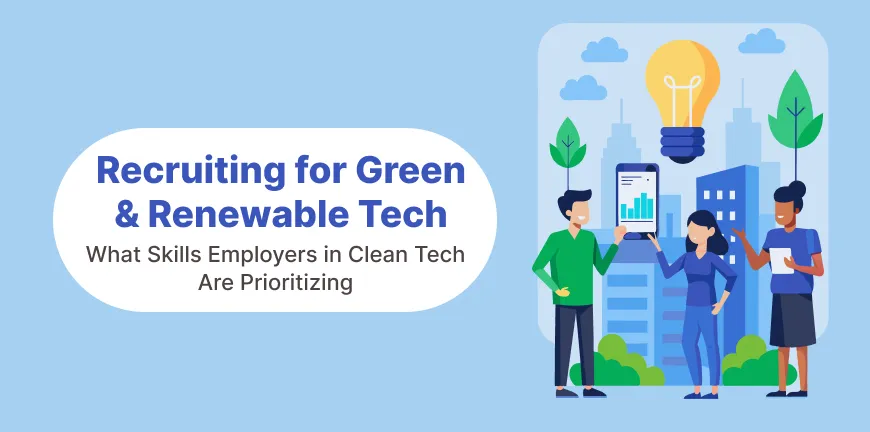
What Is an Outsourced Chief Compliance Officer (CCO)?
27/10/2025
The Difference Between Talent Acquisition and Recruitment
27/10/2025- Shifting Skill Priorities: The Reason
- Table
- The Top Skills Employers Want (2024- 2025)
- Different job roles in clean tech
- Trends Employers Are Focusing On
- Gaps and Challenges Employers Cope With
- For Job Seekers and Professionals:
- For Educators and Institutions
- For Employers and Recruiters
- Case Study
- Looking Forward
“The future is green energy, sustainability, and renewable energy.”- Arnold Schwarzenegger.
As the climate crisis takes toll on nations, they are intensifying their efforts towards green and renewable energy. With countries like Denmark, Sweden, and Germany pioneering the shift, economies like India and China are also leaving no stone unturned in investing in meeting ambitious and innovative green energy targets.
With renewable energy, decarbonization, climate adaptation, and sustainability gaining momentum, the clean tech sector is also expanding at the speed of lightning. But do you know? A great deal of challenge persists in terms of scouting for and identifying the right talent with appropriate skills.
Let us now look at the different aspects of what employers are seeking during renewable and green tech recruitment.
(Infographics)
According to reports, the highest demand sectors include Energy & Utilities (81%), Information Technology (77%), Financials & Real Estate (75%), Industrials & Materials (74%), Transport/Logistics & Automotive (73%).
Shifting Skill Priorities: The Reason
Let us try to understand why employers want a change in their skill sets for various job roles:
- Technological Revolution- The dynamically evolving technologies involved in the green energy industry, used for energy forecasting and other methods, are changing fast, and employers want individuals with niche skills to be on par.
- Rules and Policy Constraints: The concept of clean energy is being highly prioritized, and there is a slew of stringent laws that the government and regulatory bodies have implemented, shaping projects.
- Scale of Operation and its Complications: Large operations like massive wind farms, grid integration, etc, need accurate coordination of various domains, having their own protocols, safety procedures, etc.
- Use of Data, automation: Renewable tech does not entail panels and machines or turbines; it also encompasses an array of software, predictive analytics techniques, etc, facilitating an effective and trustworthy process.
Table
The Top Skills Employers Want (2024- 2025)
Let us look at some of the technical, regulatory, digital, and soft skills highly in demand in the clean tech sector:
| Category | Key Skills | Why It’s Important |
| Technical and Engineering | • Solar PV systems design, installation, O&M (Operations & Maintenance) • Wind turbine engineering, electrical & mechanical expertise • Energy storage technologies (batteries, thermal, hydrogen storage) • Grid integration, power systems modelling, transmission planning • Smart grids, IoT & embedded systems (sensors, remote monitoring) • SCADA and industrial control systems, OT (Operational Technology)Environmental impact assessment (EIA), lifecycle assessments (LCA) cybersecurity |
To build, manage, and scale renewable energy projects: solar farms, wind farms, battery storage facilities, and grid expansion. |
| Regulatory / Policy / Sustainability Knowledge | Knowledge of local & international standards, regulations, safety codes, and permitting processes • Carbon accounting, emissions reporting, ESG frameworks • Policy awareness: subsidies, grid‑connection rules, tariffs, incentives, compliance |
Ensures that projects comply with legal/regulatory demands, avoid costly delays or penalties, secure funding or subsidies, or meet sustainability targets. |
| Data and Digital Skills | • Data analytics & modelling: handling large datasets, forecasting, performance optimisation • AI / Machine Learning applications (for forecasting, predictive maintenance, etc.) • Software tool & simulation platform proficiency (e.g., HOMER, PVsyst, simulation of solar/wind, grid flow modelling) • Cloud, IoT, remote monitoring, embedded systems • Cybersecurity, especially in OT / critical infrastructure contexts |
For ensuring efficient design, operation, optimisation, and resilience. Digital capabilities also help reduce downtime and costs. |
| Project Management and Operational Excellence | • Planning, scheduling, budgeting, risk management, stakeholder coordination • Maintenance, fault detection & diagnostics, safety management • Time management, organisation, meeting deliverables under pressure • Quality control, operational standards (reliability, uptime) |
To ensure projects are delivered on time, safely, within budgets, and perform well over the long term. |
| Soft / Interpersonal Skills and Adaptability | • Communication and stakeholder management (communicating technical concepts to non-technical audiences; working with communities, regulators, etc.)
• Teamwork across disciplines (engineering, policy, finance, operations) • Problem solving, creativity, critical thinking • Adaptability/flexibility (because regulations, markets, and technologies shift) • Emotional intelligence, cultural sensitivity, especially for projects impacting local communities or with social implications |
Clean tech tends to involve multi-stakeholder involvement, sometimes in remote or regulated contexts; soft skills help avoid conflicts, enable smoother execution, and innovation. |
Different job roles in clean tech
- Renewable Energy Engineer / Design (Solar / Wind / Hydro / Bioenergy, etc.)
- Operations & Maintenance (O&M) / Asset Management
- Energy Storage / Battery / Hydrogen Specialists
- Smart Grid / Grid Connection / Transmission Planning
- Sustainability / ESG / Policy / Regulatory Roles
- Data / Digital / AI / IoT roles in Clean Tech
- Project / Program Management
- Trends Employers Are Focusing On
Trends Employers Are Focusing On
Here are a few of the emerging trends employers are emphasising to acquire perfect professionals for various job positions:
1. Skills-based Recruitment
Employers today are keener on hiring professionals who have expertise in practical work and experience rather than holding degrees.
2. Skills integrated with AI and Automation
Technical roles like mechanical and electrical engineering are no longer exclusive; they need to be merged with the latest technologies like AI and Predictive analysis tools.
3. Cross-Functional Knowledge
Professionals who know various disciplines and tech restrictions, along with business and engineering, are the ones who can make a difference and who are in demand today.
4. Sustainability and ESG Expertise
As there is mounting pressure from the government, regulators, and consumers for sustainable practices, clean energy organizations are now focusing on how to facilitate sustainability, manage chain impacts, emissions, etc.
5. Responsive and Thriving During Challenges
Skills in the clean tech industry are all about quick learning and adjusting to new tools and environments that keep evolving, uncertain landscapes, etc.
Gaps and Challenges Employers Cope With
Let us understand the existing gaps that job seekers need to focus on:
1. Dearth of candidates with technical and ESG Skills
Engineers are mostly skilled with technical knowledge and lack the understanding and fluency in terms of regulations and ESG policies, making it difficult for employers to integrate the two.
2. Lacking experience in emerging and innovative tech
Many new and improved technologies are integrated with various domains in the clean tech sector, and very few professionals have the intense hands-on experience that is required.
3. Soft skills are given less importance.
The communication styles, collaborative characteristics, and skills essential for an interdisciplinary system are not always paid heed to during technical hiring.
4. Constant learning and development
There must be a continuous process when it comes to imparting knowledge to professionals by providing them with courses and certifications. Candidates also must have the required credentials, but sometimes many candidates are unaware of which course to enrol in or lack access.
5. Alignment Strategies
You might be a candidate, an educator, a recruiter, or an employer. These are certain methods you must adopt to cater to the market requirements:
For Job Seekers and Professionals:
- It is essential to create a robust portfolio of the projects you have designed or been a part of
- Keep upgrading yourself, especially in the areas of new technologies and tools that are relevant in the clean tech industry.
- Acquire certifications in ESG, sustainability reporting, green building, technologies, etc.
- Hone your ability to communicate and explain technical ideas and concepts to the management and concerned people in the industry.
For Educators and Institutions
- Put effort into amalgamating various disciplines, policies, and social sciences.
- Collaborate with industry heads to obtain real-world information and knowledge to impart hands-on experiences and knowledge to students.
- Offer courses in domains like monitoring, IoT, data analytics, etc.
- Support students to acquire credentials or micro-credentials.
For Employers and Recruiters
- Design job adverts that portray a clear picture of what is required
- Tap candidates who have the desire to learn and can demonstrate practical skills rather than considering elaborate resumes.
- Offer additional training during onboarding to avoid skills mismatch.
- Encourage collaboration across departments and internal teams and provide exposure to various disciplines, and guide them in comprehending the nuances.
Case Study
In India, a survey by ManpowerGroup discovered that 84% of companies were looking to hire people with green skills. These were not restricted to energy firms. Sectors like IT, transport/automotive, logistics, and utilities all had green skill demand.
Looking Forward
The future of the clean tech sector looks bright with a plethora of new-age job roles awaiting. There will be openings in the areas of hydrogen technologies, recycling of solar panels, and wind turbines, usage of AI interfaces, and integrating AI tools in the various domains, fluency in adapting policies and rules, and a lot more.
Recruiters must be smart when it comes to hiring in clean tech, as hiring in this area is not just about technical expertise but also about looking for professionals who are digitally competent, well-versed with policies and rules. Can learn quickly and can communicate proficiently with the flair of resolving complex issues across departments.
For individuals looking for jobs, they must focus on syncing skill sets to the expectations of the industry through micro‑credentials, innovative projects, and multidisciplinary work. Employers will thrive if they can match the recruitment criteria to the new and improved technological and policy trends marching forward to meet the sustainability objectives.

Amit Saproo
Amit Saproo is the Head of Operations at ALP Consulting with nearly 17 years of experience in Executive Search, RPO, Leadership, and IT & Engineering recruitment. He leads nationwide recruitment programs across Technology, BFSI, and R&D domains, driving strategic hiring solutions for diverse client needs. Amit excels in building and managing high-performance teams that deliver scalable, end-to-end recruitment and consulting services.



